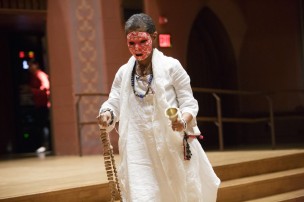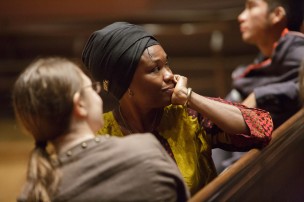
The audience looked around Memorial Chapel the evening of Thursday, Oct. 15 in an attempt to identify where the voices were coming from. Gina Athena Ulysse sang tauntingly, “Ready or not, here I come,” from the balcony seating above the audience as everyone sat on the edge of their seats, eyes wildly moving around. She moved, darting through the Chapel and finally to the stage. She began to read old legal documents detailing slavery—the prices attached to human beings alongside things such as linen and firearms.
“The dead do not like to be forgotten,” Ulysse said.
Ulysse used repetition and volume to enunciate her points and ultimately capture the attention of the crowd. In the presentation, entitled “Atlantic Reasonings between Caribbean Sisters,” she spoke of slavery, colonialism, and racism.
“I came of age colonized,” Ulysse said.

Ulysse was born in Haiti and has lived in the United States for more than 30 years. She is a Professor of Anthropology at the University and author of “Why Haiti Needs New Narratives” and “Downtown Ladies,” and last year won a 2015 Binswanger Prize for Excellence in Teaching from the University. In addition, she is the creator of a one-woman show, which she has performed worldwide.
The other performer, M. NourbeSe Philip, is a Toronto-based poet, essayist, novelist and playwright who was born in Tobago. Essays she has authored include “A Genealogy of Resistance,” “Showing Grit,” and “Frontiers.”
Ulysse specifically focuses on the concept of public anthropology in her work and how it can be used to address issues beyond conventional studies of anthropology. Public anthropology can function as a way to highlight social issues throughout time and engage a public audience in a discussion of how to facilitate social change.
“The European world view has obviously dominated this field while, and that affects how we examine other cultures: ‘the other,’ as academics sometimes say. And how we have treated ‘the other,’” said Stephanie Elliott, who helped coordinate the event with the Wesleyan University Press.
After Ulysse left the stage, the audience was once again baffled by the sound of bells coming from an unidentifiable source, reverberating through the room. Unintelligible voices —almost ghostly —were soon heard. Suddenly, Phillip came into view, moving along the balcony wearing a mask and solemnly shaking bells, as confusion once again struck the observers.
“Her presence was more in keeping with a ceremony than a poetry reading or performance,” Elliott said.
Phillip spoke of the connections between those living in the present and their ancestors, as well as the dehumanizing effects of the English language on Africans. Her style was quiet and meditative, leaving audience members on the edge of their seats as she spoke on transnational identity.
“Should they have found me sufficient?” Philip asked.
Elliott spoke about the particular worldview behind Philip’s work.
“Reusing the language of the legal documents, Philip gets to heart of how slavers used language to dehumanize enslaved Africans, and how Europeans and Euro-Americans continually used language to take advantage of others while deceiving themselves,” Elliott said . “It could be argued [Philip’s worldview is] more observant and contemplative than our Western worldview.”
Audience members were inspired to think critically on the outcomes of issues such as identity, racism, and colonialism.
“Watching the women speak, sing, and move, enchanting and challenging the audience, I was reminded of a discussion we had in class about avant-garde art being a means of expression for white artists, while there is a demand on artists of color to ‘feel’ and represent emotion without radical expression,” said Tatum Millet ’19, who attended the event for her Latin@ Literature class.
Millet drew comparisons between the work of Beatriz Santiago Muñoz and the artists, saying that these artists were able to communicate histories, thoughts, and emotions of Haiti through a radical poetic form.
A large part of the performances focused on language, especially English and the way it came to serve as colonizing language throughout history. As they felt they were oppressed by English, the artists reclaimed the use of this language for an empowering performance.
“[It was] an opportunity to experience living, breathing examples of different world views in action,” Elliott said.


Leave a Reply